P55 Overclocking Showdown - ASUS, Gigabyte, and EVGA at the OC Corral (Page 6 Updated)
by Rajinder Gill on November 6, 2009 12:00 PM EST- Posted in
- Motherboards
Max CPU BCLK and MHz
We used a 750 CPU for this part of the test, comparing maximum attainable BCLK using a 17x multiplier, maximum overall CPU clock validation using the same multiplier and finally the maximum Super Pi 1M pass frequency. The reason for using an i750, well, our two 870s did not survive due to the socket burn problem and before we torture our replacement processors we would like some assurances it will not happen again. As such, i750 results for the ASUS board are missing until we receive a replacement board.
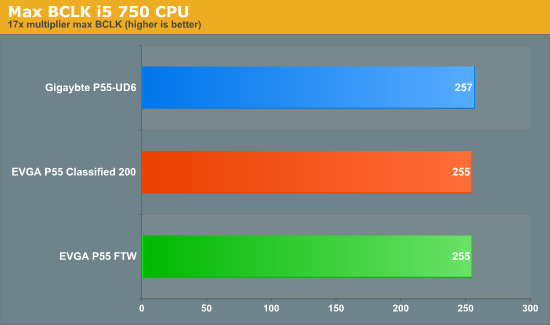
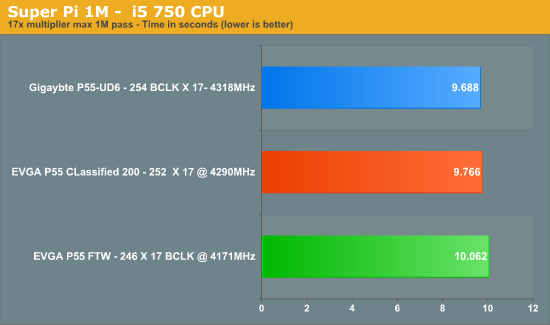
Note that using a lower CPU multiplier of 17X the Gigabyte board manages to beat the EVGA boards by 2 BCLK for outright CPU-Z validation and the EVGA P55 FTW by around 8 BCLK for Super PI 1M. At 21X however, that initial promise of higher ‘validation stable’ frequencies does not translate into higher overall overclocks even in light load benchmarks like Super Pi 1M.
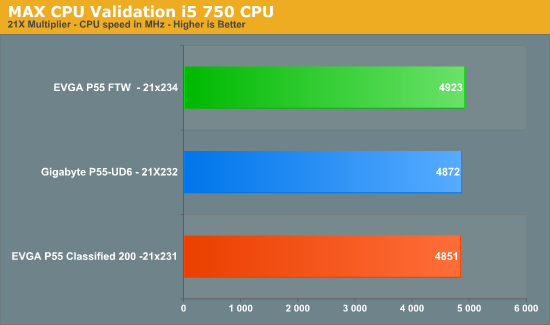
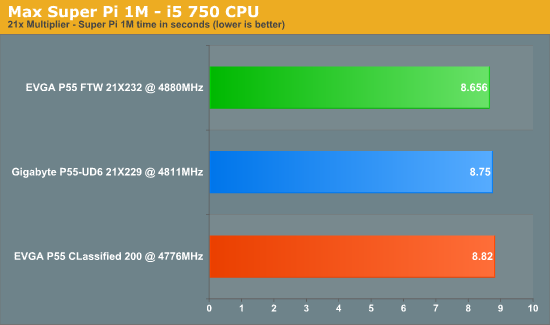
Although we managed to get a 1M to pass at 233x21 on the Gigabyte board, every time we tried to open CPU-Z to capture a screenshot, the system would crash. In the end we had to step down to 229X21 at 9-9-9-24 memory timings in order to get a screenshot with all relevant CPU tabs shown. This left us scratching our heads because at higher BCLKs using the lower CPU multipliers, the Gigabyte board showed better overall stability for validation and Super Pi 1M when pushed over 245 BCLK than the EVGA P55 FTW.
The EVGA E659 was a disappointment in this section of our testing too. Our maximum Super Pi 1M came in at 21X228 BCLK, while max validation stopped at 231 BCLK, trailing both the cheaper EVGA 657 and Gigabyte P55 UD6. This leaves the E659 as a board capable of lower stable memory speeds than the other boards in our testing with its one strength being 8-thread non-memory intensive system loads like WPrime 1024M.
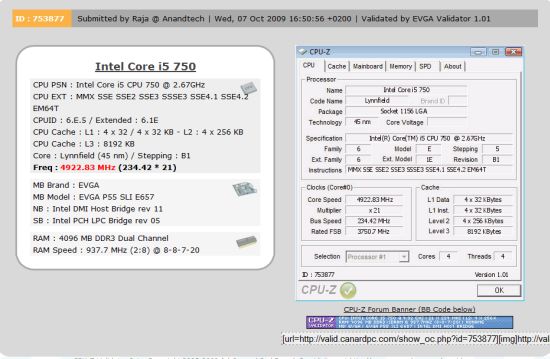
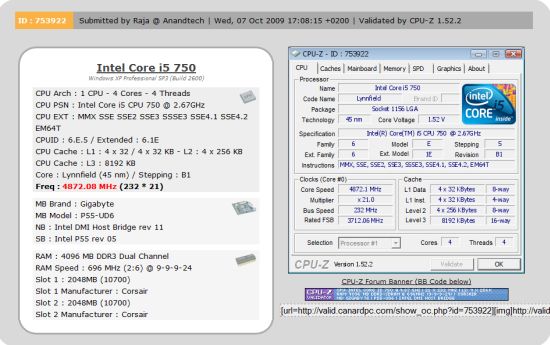
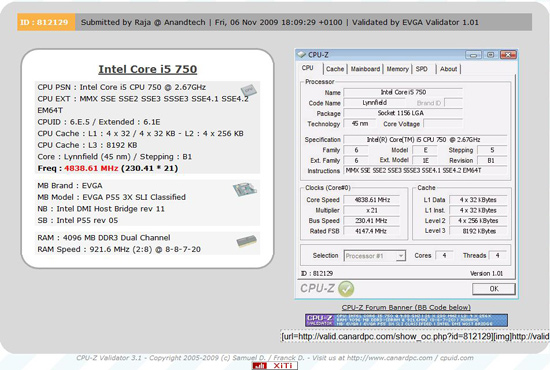










52 Comments
View All Comments
McDaniel - Sunday, November 8, 2009 - link
Gigabyte is always ahead in cooling trend.. nice review anyway.. is it possible to set my old processor(core2duo) on this main board? & by the way where i should go for it?darkslyde - Monday, November 9, 2009 - link
you can't use socket 775 CPU in a socket 1156 board.but AFIAK, you can use socket 775 cpu cooling (heatsinks, cpu waterblocks) on the P55 evga boards. it has mounting for both 1156 & 775. that's one thing you can save on...
if you want to re-use your c2d (i.e e6600) there are good intel G/P/X 4X series and nvidia geforce 7000/9000, nforce 700 boards.
i'm reusing my old E6600 on an ASUS P5N7A-VM for media pc use. i get to use my old ddr2 dominators too.
techraze - Sunday, November 8, 2009 - link
Yes, you certainly can use it for core 2 Duo. but as this main board is designed for core i7/core i5 & their over clocking performances it's wise to have a new processor for this main board. i also did it recently & http://micropartsusa.com">http://micropartsusa.com can be a site for u also..anyway good luck dudeyyrkoon - Sunday, November 8, 2009 - link
As a matter of a fact. Doing some looking around I saw . . .LGA 1366 == i7 only
LGA 1156 == i5 only
LGA 775 == Core 2 duo, core 2 quad, core 2 extreme ( just another core 2 ), Pentium 4, and Celeron ( could be based on core2, P4, or others, but so long as LGA 775 pin layout).
Of course, with LGA 775, some manufacturers do not allow all CPU types, but it is possible for them to do, if they wish.
erple2 - Monday, November 9, 2009 - link
Technically,LGA 1366 == Certain i7 (9xx parts).
LGA 1156 == i5 and SOME i7 (8xx parts).
LGA 775 == Core2Duo, Core2Quad, and some Pentium 4 parts (any after "Northwood"), and some Celeron parts.
yyrkoon - Sunday, November 8, 2009 - link
Uh, you know I have not really looked into it, but I am fairly sure a socket 775 CPU would not fit into these newer sockets. Unless Intel took extreme precautions they normally have not in the past. I7 is what? 1368 pin ? Socket 775 is . . . 775 pin . . .MrCommunistGen - Saturday, November 7, 2009 - link
In the first paragraph of page 8 (the Gigabyte GA-P55-UD6 page)you mention cooling on the "ICH10R". It should probably say "PCH" instead.leexgx - Saturday, November 7, 2009 - link
even past reviews never seen these types of problems before guess P55 is an no go until they fix the socket issues (overclocking or not)yyrkoon - Saturday, November 7, 2009 - link
"Unfortunately, any jubilation for a platform winner ends here until we know the exact cause of the issues we experienced on motherboards using the Foxconn 1156 sockets."Does this mean that all boards use this socket ? Or does it mean that the ones you wish to be winners use this socket?
I also find it odd that you would mention the Gigabyte board is good, but costs too much, where surely it is fairly priced compared to many Asus boards of the past. Yeah, the same company who seemingly wins all of your top awards, and comparisons.
Asus is *not* that good. EVGA is definitely not that good. and Gigabyte while not perfect definitely is not as bad as you make it seem. Not only that, these three companies are definitely not the only three in the motherboard business. Why is it that MSI, DFI, and other board makers are no longer sending you samples for review ? Hmm . . .
Rajinder Gill - Saturday, November 7, 2009 - link
Gary has the MSI board already; it was not tested in this compare because of CPU damage. The too expensive comment is aimed at the EVGA Classified 200 which does not deliver a significant advantage over the other boards in terms of CPU/memory overclocking even for the extreme crowd. DFI's board was not ready as early as the 4 boards we have tested here.The socket comment was made because in light of the failures we experienced during testing. Our failures have been all related to Foxconn sockets, but there is now a confirmed user case having issues with a LOTES socket too. In light of this, it's hard to give any board accolades for raw overclocking until we know for sure that the 'problem' is fixed. Out of all the boards, the EVGA P55 FTW was the most consistent and easy to use. Also note, this article is in no way reflective of 24/7 PC's and what matters in typical usage scenarios.